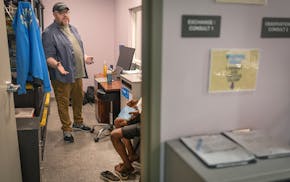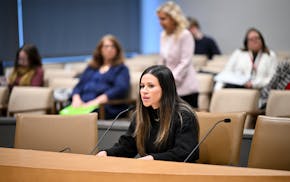Rose Mingo-Holtz was preparing for a class at her French language school in Minnetonka when she heard the news from her husband: Republican vice presidential candidate and Ohio Sen. JD Vance was circulating a rumor about Haitian immigrants eating pets.
Her first reaction was incredulity. But when she turned on the TV, and later saw people reposting the false claims on social media, she began to feel alarmed.
"To be honest, I am trying to keep my calm," she said. "I started to worry and I don't want to receive threats against the school."
Mingo-Holtz, who founded Mes Amis French School in 2005, is one of approximately 4,000 Haitian Minnesotans. Many are here under temporary protected status (TPS) or humanitarian parole. Others are U.S. citizens.
All say the false rumors about Haitian immigrants in Springfield, Ohio, later amplified by former President Donald Trump, add to the stress and uncertainty they feel about their welcome here.
"Personally, it traumatizes me," said Florencia Pierre, a Haitian artist and community organizer based in Minnesota. "You feel that you always have to fight to be appreciated by others; you're so stressed that you develop cardiovascular illnesses."
Pierre, also called Maman Fofo in the community, moved to the U.S. after the 2010 earthquake in Haiti. She joined her daughter, Djenane Saint Juste, who had left a few months earlier. Since then, the family has not been able to move back to Haiti because of the insecurity and political instability.
After the earthquake, the Obama administration granted TPS to Haitian nationals. Today, 200,000 Haitians live in the United States under TPS, a status that Pierre described as a limbo.
Every 18 months, her family has to pay and renew their protection, and their eligibility depends on the will of the president. In 2017, Donald Trump paused TPS for nationals from Haiti, Nepal, Sudan, Nicaragua and El Salvador, but a federal judge blocked his plan.
"We are not moving forward," Saint Juste said. "We have the security of not being kidnapped, but other than that, it is a tragedy. It is a constant traumatism."
After 15 years living in the U.S., Saint Juste was refused her green card application.
Black feminist theorist and writer Beaudelaine Pierre describes TPS as a "constant state of dispossession." Previously a scholar at the University of Minnesota and now teaching at the University of Massachusetts, Pierre said immigrants not only have to pay to constantly renew their status, but they're also separated from family.
"You cannot even go home," Pierre said. "People on TPS can apply to travel outside the U.S., but it costs $600, and it comes six months after. That means many of us lose parents, lose fathers and mothers."
Without an authorization to leave the country, immigrants on TPS cannot return to the U.S.
Beaudelaine Pierre was not surprised by Vance and Trump's claims.
"What was said in the debate is a reflection of how Haitian folks are treated on an everyday basis," she said.
She said the false claims about legal Haitian immigrants in Ohio reflect the anti-Haitian sentiment ingrained in U.S. institutions and imagery.
"Many Haitians know that whatever their level of integration is in the U.S., since 1804, following the independence of the country, they have been punished systematically by the U.S. government because of the fight for their freedom," Pierre said.
Haiti was the first free Black republic in the Western Hemisphere, and Pierre noted that slave owners feared that it would inspire other Black people during an era when slavery was still legal in the U.S.
In Minnesota, culture and tradition help the Haitian community persevere. Saint Juste funded the cultural organization Afoutayi, to celebrate Haitian culture, dance, music and fashion. Maman Fofo dances, acts, sews the clothing for Afoutayi and cooks for the community.
Every year on May 18, Saint Juste organizes the Haitian Flag Day celebration. The event started with 10 people; now more than 200 attend.
Haitian community organizer David Policard noticed that the community was fractured because of the different waves of Haitian immigration. Newly arrived immigrants reach out to churches, Somali or Hmong organizations. But they often face language barriers, as few people speak French or Créole.
Policard recently launched Vanse, a platform to help Minnesota's Haitians access jobs and services.
"When they come here, it is difficult to access higher-paying jobs that would allow them to progress out of poverty," he said.
Policard enrolled his young son at Mes Amis French School. There he can speak French, stay connected with his Haitian roots outside of home, and Mingo-Holtz sometimes talks to him in Créole as well.
"Beyond language, I wanted a school where he would be seen and treated as himself, not 'othered,'" Policard said.
About the partnership
This story comes to you from Sahan Journal, a nonprofit newsroom dedicated to covering Minnesota's immigrants and communities of color. Sign up for a free newsletter to receive Sahan's stories in your inbox.

One man dead in shooting Friday outside Northtown Mall in Blaine

Four arrested, no one injured in fighting and shooting following Burnsville High School graduation

Meth makes comeback in Minnesota in more dangerous and record ways
U faculty and students fear budget cuts and tuition hikes will reduce staffing and enrollment
